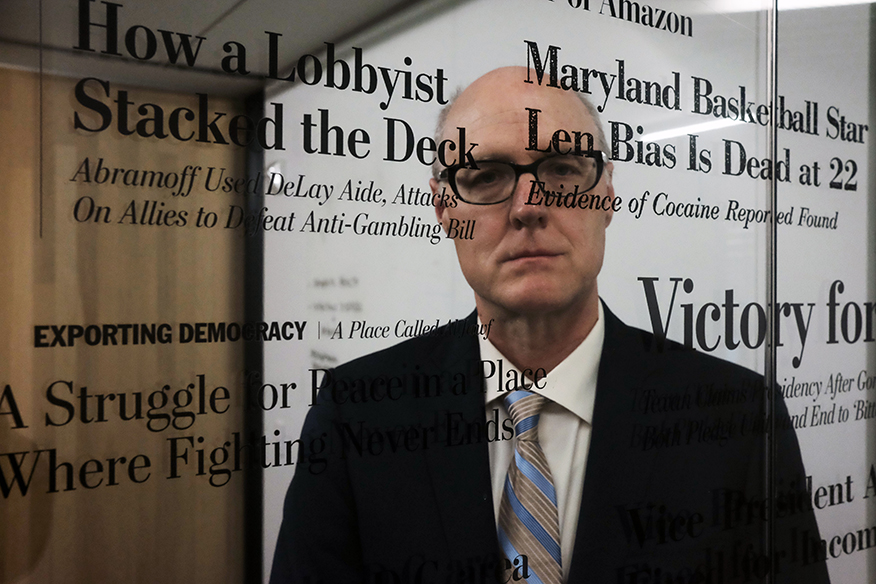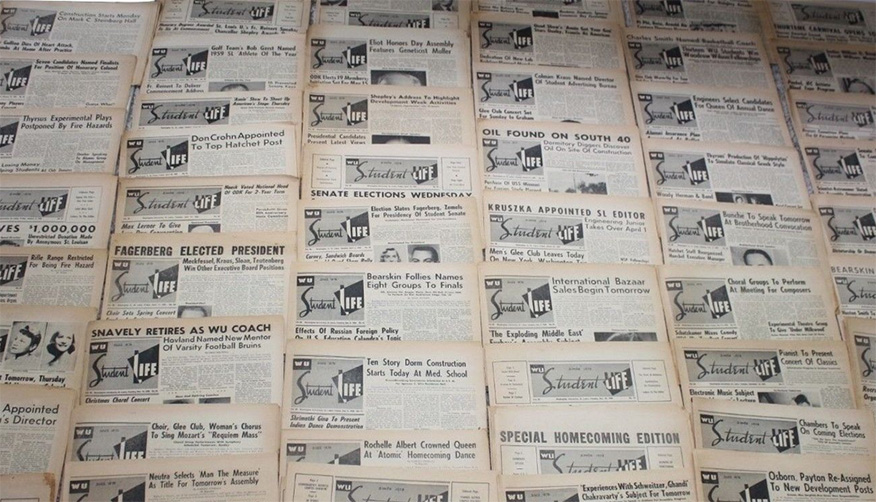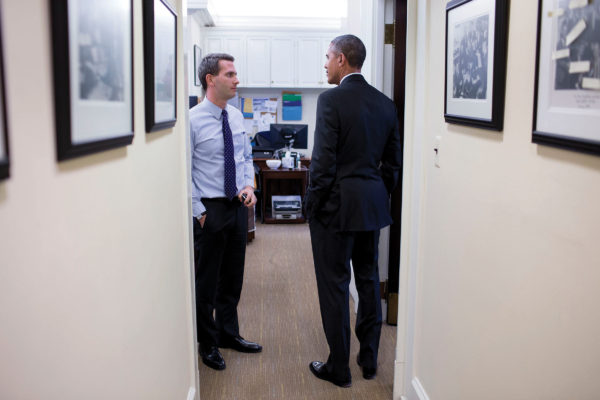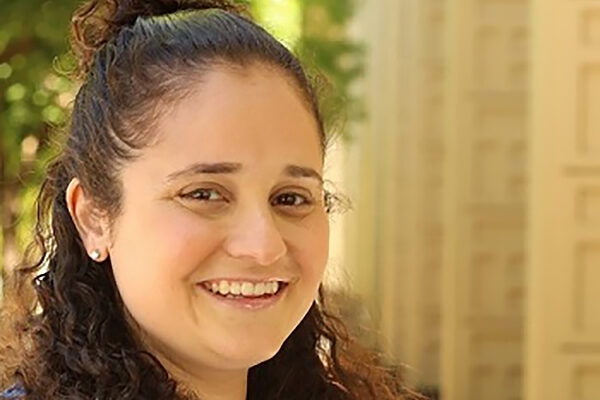The headline stretched across all six columns, proclaiming “Plan Announced for Student Life” in big block letters. It was the Friday, March 18, 1932, paper, issue 44 of volume 56 of Student Life. Waiting 54 years after the paper’s founding in 1878 to announce any sort of plan seems overly cautious, even by newspaper standards, but that’s what the editors went with that day.
In actuality, the plan being announced only introduced a new journalism class offered by Washington University and incorporated the editing of Student Life into the offering’s course work. The misconstrued headline, however, does speak to the paper’s longevity. If told a college newspaper originated in 1932, few would blink twice. It’s the paper’s 140 years of publishing that’s eye-opening and makes Student Life one of the oldest college papers in the country.
Currently a twice-weekly print publication with online-only extras, Student Life has no intentions of shuttering soon. In fact, in the absence of any robust journalism education at the university (U. College offers classes in the discipline), the paper has become the de facto training for aspiring journalists.
It’s the feet-to-the-fire approach to learning, or project-based learning in modern parlance. Students are given their assignment and guidelines for reporting by more-experienced editors, but otherwise, it’s up to the student to make his or her own mistakes and learn from them.
Some of the more successful former staffers attribute much of their journalistic development to this approach. “You’re actually just testing out the skills that you’re going to use as a professional journalist,” says Sarah Kliff, AB ’07, a senior policy correspondent at Vox.com. “You could make mistakes and have that safer space to learn from them.”
Jonathan Greenberger, AB ’05, the current ABC News Washington bureau chief, echoed that sentiment, appreciative of the opportunity to test the bounds of journalism without the higher stakes of his current job. Greenberger also added that beyond training, the paper provides a vital service to the WashU campus. It tackles nuanced issues and complicated stories with regularity, including campus protests and presidential debates or even a combination of the two.
To put it more bluntly, Student Life covers stories that no other campus publication can touch. Or in the words of another prominent Student Life alum Jeff Leen, AB ’79, who is the investigative editor-in-charge of the Washington Post’s investigative units, “Student Life lives on, as a necessary voice for students.”
‘Tackling things that are gray’
Education tends to train Pavlovian responses in its students. For nine months, a student works hard, studies, writes, makes the grade and is rewarded come May with an advancement to the next level and a nice three-month break. It makes May synonymous with success.

After 16 years of gradually progressing up the educational ladder, Jonathan Greenberger had internalized that expectation of reward like so many other students. Even with Student Life, he had gone from reporter, to editor, to senior editor, to editor-in-chief, finishing the ladder by landing a job at ABC News following his graduation.
When the next May rolled around, Greenberger was a year out of college and in a funk. Confused, he went to ask a mentor why. “Every May of your entire life, you’ve been promoted,” the mentor responded, finally putting words to what Greenberger had been living. “And that’s not the way the world works.”
With a new and clear understanding, Greenberger threw himself into his work. Eventually, the next rung on the ladder appeared and the next and then the next. Having started as George Stephanopoulos’ assistant at ABC, Greenberger is now executive producer for This Week with George Stephanopoulos. He also serves as vice president and chief of the D.C. bureau for ABC News.
The path wasn’t as linear, though, as progressing from grade level to grade level. Greenberger took a detour in the middle to earn a JD from Stanford Law School before returning to ABC News. The decision to leave for law school was predicated by the culmination of the 2008 election, when Greenberger was advised by colleagues and mentors that that election might be the most historic event he would ever cover. So he looked for a new ladder to climb.
“What makes journalism fun is dealing with the ambiguity and the challenge of tackling things that are gray.”
Jonathan Greenberger, AB ’05
“I think on some level if I had stayed at ABC at that point, it would’ve been like marrying the first person [I’d] ever dated,” Greenberger says.
Law school taught Greenberger to think more critically about the world and gave him time to explore who he was as a person. Those two lessons still inform how he advises the young journalists at Student Life from his present position on the paper’s board.
“I think sometimes when you’re a student journalist, there can be a tendency to see things as a little bit black and white,” Greenberger says. “Actually what makes journalism fun is dealing with the ambiguity and the challenge of tackling things that are gray.”
Of course, Greenberger issues the reminder that success in journalism isn’t black or white either or on a timeline — sometimes you just have to put in the work.
Producing deep analysis on complicated issues
After high school, Sarah Kliff never could have imagined she would interview President Barack Obama about his health-care policy. In fact, there wasn’t even a President Obama then, and Kliff wasn’t interested in journalism. She just wanted out of her parents’ home, and the earlier the better.

She got her wish with Freshman Press, the Student Life pre-orientation program that allowed Kliff to move to WashU five days early. From there, it was a career foretold. She came to love working for the paper, made some of her closest friends over her four years at Student Life and then landed an internship at Newsweek, thus beginning her professional journalism career.
Nowadays, Kliff’s apathetic journalistic beginnings are a source of amusement.
“My dad used to be a journalist, and I thought it was the least cool thing in the world to do what one of your parents did,” Kliff says with laugh. “I thought I would just do it as an extracurricular, and it wouldn’t be what I would do for a career.”
What changed her mind as she worked her way up the ranks of Student Life was not necessarily the friendships or her time at Freshman Press, but the opportunity to shamelessly pepper all sorts of people with questions.
“I love interviewing people; I love telling their stories,” Kliff says. “It’s always felt like a huge privilege to me to be able to go up to total strangers and ask them often pretty intimate, important questions about the details of their life.”
“It’s always felt like a huge privilege to me to be able to go up to total strangers and ask them often pretty intimate, important questions about the details of their life.”
Sarah Kliff, AB ’07
While that natural curiosity propelled Kliff to stick with Student Life as an extracurricular, it was a more practical reason that changed her mind about having journalism as a career: She needed a paycheck.
Taking the internship at Newsweek put her in the position to be hired by the magazine, covering health care for three years. From there, she moved to Politico and then the Washington Post. At the Post, Kliff met Ezra Klein. In 2014, Klein left the Post and co-founded Vox to produce deep analysis on complicated issues such as immigration, the environment and foreign affairs. He also hired Kliff to continue covering health policy.
Which brings Kliff’s story back to President Obama. Sitting with Klein and the outgoing commander-in-chief, Kliff was able to question the world’s most powerful man about his administration’s defining policy. After nearly eight years learning everything she could about American health care, she had reached the beat’s zenith.
With President Obama out of office now, Kliff’s not done digging. Today, she writes more about the effects the policy has outside of D.C. Whether a person lives in Kentucky or California, Kliff wants to know where the policy and the individual intersect. As part of the exploration, she has produced a podcast called “The Impact,” and she’s part of a trio, including Klein and Matt Yglesias, creating a podcast for people who like to hear deep analysis about politics and the impact of policies on people’s lives.
Hunting facts and connecting dots
The whole town assumed he was innocent. The banker from Kirksville, Missouri, had been found guilty in a check-hiding scandal involving a local cattle baron, but the townspeople believed that the banker was being railroaded by the richer man. Jeff Leen, a reporter at the time for the Columbia Daily Tribune, talked to everyone — friends, family, anyone and everyone in the town. They all said the same thing: innocent.

But the prosecution team told Leen to go to St. Louis and read the appellate court briefs. Working for $150 a week, the extra effort was above Leen’s pay grade, but he did it anyway. The prosecutors were right.
“It became really apparent that this guy was guilty as sin,” Leen recalls thinking as he read through the briefs.
His story, initially intended to be about the unjust prosecution of an innocent man, became Leen’s first foray into investigative journalism. He soon wrote another, diving into the mental health history and saga of a schizophrenic woman whose parents kept her tied to her bed. Both investigations won Missouri Press Awards for Leen.
Now the editor-in-charge of the Washington Post’s investigative units, Leen oversees a team of 16 investigative journalists, and has worked with Bob Woodward of “Watergate” fame. And Leen has clearly stuck with his bloodhound nose for good reporting. Though print journalism is struggling across the nation, the Washington Post has seen its digital subscription rates surge, thanks largely to the work of Leen’s team. Big scoops include an investigation into Alabama U.S. Senate candidate Roy Moore’s interactions with teen girls and another of sexual harassment complaints against former CBS and PBS star Charlie Rose.
“I’m somebody who actually like[s] to go out and connect the dots,” Leen says. “I am instinctually a hunter of facts rather than a gatherer.”
But that investigative proclivity hasn’t always been there. During his time at Washington University, Leen was torn between two worlds: journalism and fiction writing. A contributor to Student Life but also a senior editor of the literary magazine Subject to Change, Leen saw himself as a short story writer. But when he needed a job after graduation, he turned to journalism and the suburban weekly that employed him as a stringer covering sports when he was in high school, the St. Louis County Star.
“Student Life is a focusing point that can draw that talent together and give students an opportunity for the next stage.”
Jeff Leen, AB ’79
The irony that the name of Leen’s preferred publication at Washington University actually mirrors his career path cannot be ignored. Leen’s goals were always subject to change, but his inclinations never were.
As his career has twisted and turned — from the Star to the Tribune to the Miami Herald and eventually to the Post, winning a Pulitzer Prize for a five-part series with three other reporters on police shootings along the way — Leen maintained his desire to always get underneath the story and connect the dots.
He sees that same desire in present-day Student Life reporters, but more than that he sees an opportunity.
“Student Life is a focusing point that can draw that talent together and give students an opportunity for the next stage,” Leen says. “This is the opportunity for somebody who is young and still trying to figure out ‘Well, is this thing for me?”

— Wesley Jenkins, AB ’17, a former associate editor of Student Life is now a freelance writer, contributing to The Hardball Times, Fangraphs.



